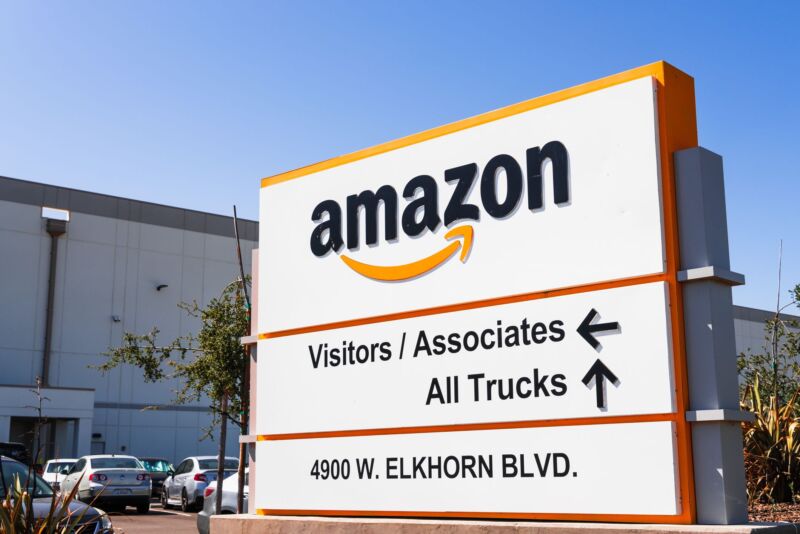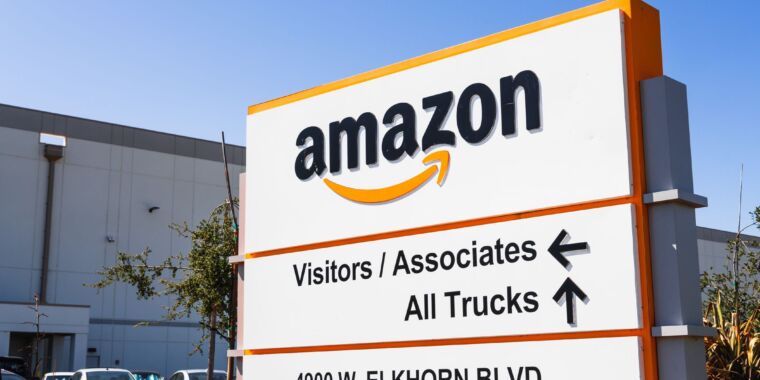
Getty Images | Sundry Photography
California’s attorney general yesterday said that Amazon has been hiding COVID-19 case counts from warehouse workers throughout the pandemic and announced a settlement in which Amazon agreed to keep workers up to date on the number of infections in their workplaces.
Attorney General Rob Bonta alleged in a lawsuit that Amazon violated a COVID-19 notification law enacted by California in September 2020 and violated the state’s Unfair Competition Law (UCL). The proposed settlement that Amazon agreed to was filed in Sacramento County Superior Court and is still pending a judge’s approval.
The settlement “requir[es] Amazon to end harmful labor practices that concealed COVID-19 case numbers from workers and to provide key information on workplace protections in line with California’s ‘right-to-know’ law,” Bonta’s announcement yesterday said.
“Throughout the pandemic, Amazon, as asserted in the complaint, failed to adequately notify warehouse workers and local health agencies of COVID-19 case numbers, often leaving them in the dark and unable to effectively track the spread of the virus,” the AG’s office said. “As part of the stipulated judgment, Amazon will modify its COVID-19 notifications to workers and local health agencies, submit to monitoring regarding its COVID-19 notifications, and pay $500,000 toward further enforcement of California’s consumer protection laws.”
Amazon argues that the law doesn’t specifically require notifying employees about COVID-19 case counts, but the state says Amazon also violated requirements for reporting to local health agencies.
Settlement requirements
The settlement announcement said that Amazon will be required to do the following in California:
- Issue notifications to its tens of thousands of warehouse workers that identify, within one day, the exact number of new COVID-19 cases in their workplaces;
- End its practice of issuing notifications that inadequately inform workers of the company’s disinfection and safety plan and employees’ COVID-19-related rights;
- Notify local health agencies of COVID-19 cases within 48 hours so they can intervene in potential workplace outbreaks.
Those provisions will be in effect for one year. California’s COVID-19 notification law is set to automatically expire on January 1, 2023.
Amazon said it didn’t break any laws
Amazon did not admit that its actions violated any laws. The settlement document says the “defendant expressly denies the allegations in the complaint, including: (i) that the conduct described in the complaint constitutes a violation of Section 6409.6 or any other law or regulation, and (ii) that the conduct described in the complaint constitutes an unfair method of competition and/or deceptive acts or practices in the conduct of trade or commerce in violation of the UCL.”
“We’re glad to have this resolved and to see that the AG found no substantive issues with the safety measures in our buildings,” Amazon said in a statement provided to Ars. “We’ve worked hard from the beginning of the pandemic to keep our employees safe and deliver for our customers—incurring more than $15 billion in costs to date—and we’ll keep doing that in months and years ahead.”
We asked Amazon if it will implement the notification changes immediately or wait until the settlement is approved by the court, and also whether it will extend the changes to US states outside of California. An Amazon spokesperson did not answer our questions but said, “This settlement is solely about a technicality specific to California state law surrounding the structure of bulk employee COVID-related notifications. There’s no change to, or allegations of any problems with, our protocols for notifying employees who might have been in close contact with an affected individual.
Amazon also said it “communicat[es] transparently to local health authorities and to our employees whenever there is a new case,” including by using “contact tracing to determine if anyone was exposed to that individual, and we inform those employees right away.”
California details Amazon’s alleged violations
Obviously, California disagrees with Amazon’s claim that its actions did not violate the law. “Defendant issues written notifications of potential exposure to COVID-19 to employees and employers of subcontracted employees in California facilities that do not specify the total number of COVID-19 cases covered by the notification, as required by California Labor Code section 6409.6, subdivision (a)(1),” the state’s lawsuit against Amazon said. “In multiple instances, notifications did not issue within one business day, as required.”
An Amazon spokesperson said the COVID-19 notification law does not contain any text requiring employers to tell workers the exact number of cases. The “subdivision (a)(1)” of the law’s text that California’s allegation referred to says employers must “Provide a written notice to all employees, and the employers of subcontracted employees, who were on the premises at the same worksite as the qualifying individual within the infectious period that they may have been exposed to COVID-19,” but does not specify that the “number” of cases must be disclosed to workers.
The law says in another section that if an “employer is notified of the number of cases that meet the definition of a COVID-19 outbreak,” the “employer shall notify the local public health agency in the jurisdiction of the worksite of the names, number, occupation, and worksite of employees” who tested positive for COVID-19. The state’s lawsuit alleges that Amazon violated this law in multiple cases when it provided reports to local health agencies (LHAs) “that did not fully notify LHAs of each of the names, numbers, occupations, and worksites of employees for subsequent laboratory-confirmed cases of COVID-19, as required… and did not send these notifications within 48 hours, as required.”
Amazon’s notifications to workers “did not fully set forth the disinfection and safety plan,” as required, and “did not fully set forth information regarding: COVID-19-related benefits available under applicable federal, state, or local laws; options for exposed employees, including COVID-19-related leave, company sick leave, state-mandated leave, or supplemental sick leave; and antiretaliation and antidiscrimination protections, as required” by California law, the complaint said. More generally, California alleged that Amazon’s actions “prevented employees, the employers of subcontracted employees, and the public from fully accessing information regarding COVID-19 cases.”
Amazon operates dozens of facilities in California “where employees fulfill customer orders by preparing, packing, and transporting products to customers,” the complaint noted.
“Unwilling to follow a straightforward law”
Bonta’s announcement said the pending settlement “arrives at a crucial time for workers as Amazon’s peak holiday season approaches.”
“Today’s first-of-its-kind judgment will help ensure Amazon meets that requirement for its tens of thousands of warehouse workers across California,” Bonta said. “Bottom line: Californians have a right to know about potential exposures to the coronavirus to protect themselves, their families, and their communities.”
The settlement was praised by Assembly Majority Leader Eloise Gómez Reyes, the lead author of California’s COVID-19 notification law. She said:
When this bill was being considered in the state legislature and subsequent to it becoming law, we heard the stories from across this state of employees who were not informed of COVID-19 exposures and had to work in conditions where safety from this highly contagious disease was an afterthought. I am happy that our attorney general, Rob Bonta, is demanding accountability and transparency from employers who have been unwilling to follow a straightforward law designed to keep workers and their families safe in these challenging times.
The “California details Amazon’s alleged violations” section of this article was updated after publication with additional information on the law’s text.
